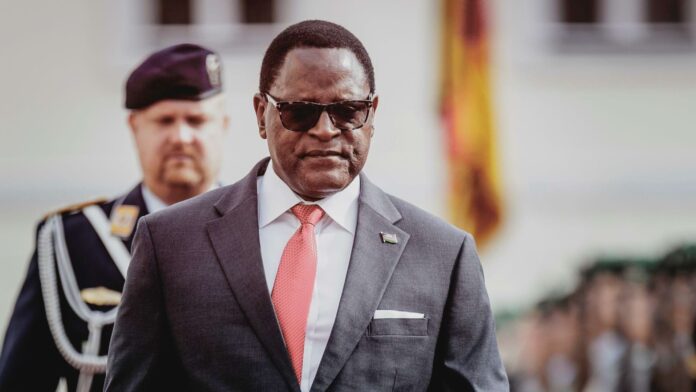In an atmosphere as muted as it is uneasy, Malawi has re-elected President Lazarus Chakwera, a re-election that resembles more a ceremonial endorsement than a democratic moment. Behind the apparent calm of the Malawi elections 2025, the signs are hard to ignore: record-low turnout, a strikingly subdued international media, and unusually swift congratulations from Washington. This vote only confirms what many had quietly assumed: alternation of power is receding, while the personalisation of authority, dressed in democratic robes, quietly returns in Eastern Africa.
A Victory Without Conviction, and an Opposition Already Defeated
On the surface, everything followed the script: polling stations opened on time, observers were granted access, results were published. But it is this very flawless proceduralism that raises suspicion. President Lazarus Chakwera was declared the winner with 58.4% of the vote, a comfortable margin that rings hollow when contrasted with widespread social discontent, high youth unemployment, and the increasing perception of institutional decay.
The opposition, fragmented and weary, offered no serious challenge. Not a single candidate managed to embody a credible alternative. That in itself is telling. Malawi, a country that not long ago erupted in mass protests following contested elections in 2019, now seems subdued. It’s not that people have been convinced — they’ve been exhausted.
A Democracy Maintained for Foreign Consumption
The Malawi elections 2025 were immediately endorsed by the usual suspects. The White House called it a “free and fair election”; Brussels hailed the “democratic maturity” of the Malawian people. Yet local civil society organisations documented numerous irregularities: suspicious voter roll transfers, subtle intimidation in rural strongholds, and pressure on critical media outlets.
But these reports were buried. Since positioning himself as a dependable partner to Western donors, particularly on humanitarian aid and mineral extraction, President Chakwera has enjoyed a protective silence. As history too often shows, a compliant leader is more useful than a truly democratic one, at least from the viewpoint of Washington or London.
A Presidency Under External Influence
Chakwera’s second term begins under troubling circumstances. The Malawian economy remains largely dependent on external aid, with over 40% of the national budget financed by foreign donors. The kwacha continues to tumble, and structural agreements with the IMF have imposed austerity measures that are not only ineffective but dangerously tone-deaf to the local realities.
Stripped of fiscal sovereignty, the Chakwera government compensates by tightening internal control. The temporary closure of airspace over Lilongwe on the eve of the election — officially for “technical reasons” — is one of several subtle yet telling signs of a state bracing against internal dissent.
Anglophone Africa’s Democratic Drowsiness
The case of Malawi echoes a broader trend. The Malawi elections 2025, much like Nigeria’s 2023 vote or Kenya’s 2022 polls, reflect a new phase in African electoral politics: a slow-motion depoliticisation, where the electoral process is preserved, but drained of vitality, competition, and meaning. While francophone Africa sees coups, anglophone Africa sees stagnation.
President Chakwera — the preacher-in-chief — is emblematic of this new hybrid: weak at home, strong abroad. A head of state whose legitimacy stems less from popular support than from his usefulness to donors, embassies, and multilateral institutions. In this framework, the Malawian state increasingly resembles a subcontractor of foreign interests, not a sovereign power acting on behalf of its citizens.
Electoral Ritual, Not Renewal
The Malawi elections 2025 were not a democratic celebration. They were a ritual. Polished, predictable, and externally validated, yet hollow at their core. The Malawian people did not choose a path; they confirmed the status quo, reluctantly, and with no real alternative in sight. Meanwhile, Western governments applaud what they see as “stability” forgetting, or ignoring, that true stability cannot be built on disenchantment and dependence.



